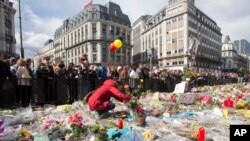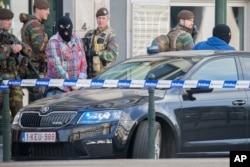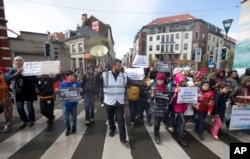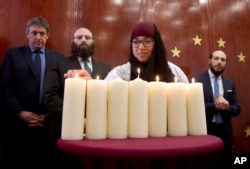Six months after the attack on the Brussels airport and a metro station, survivor Pauline Graystone says she and her family are okay.
"The first few days were a mix of disbelief, adrenaline, feeling hyperactive and numb. And certainly not able to concentrate on anything much. And later on, a general feeling to be determined not to let it stop us getting on with life. Still now I occasionally have a strong feeling of how lucky we were, and how others were not."
Images of Graystone lying on the ground with her husband while protecting her daughter were shared around the world. She and her family were standing by a check-in desk when terrorists detonated two bombs at the Zaventem airport. A third bomb exploded later at a metro station close to European Union buildings.
A total of 32 people lost their lives and more than 300 were injured during the worst terror attacks in Belgian history. One victim is still hospitalized.
A Belgian parliamentary committee investigating the March attacks is expected to conclude its study by the end of 2016. A mid-term report released in August focused on emergency services and made several recommendations about improving communication lines and including terror responses to all emergency plans.
Committee chairman Patrick Dewael says no lives could have been spared even if communication had been faster.
“Take for example, the order to close the Brussels metro that wasn’t communicated in time to the right authorities. At that moment the terrorist was already in the metro,meaning this attack could not have been avoided.”
8 suspects arrested
Eight suspects linked to the Brussels attack have been arrested and the security threat level remains at three out of four. Belgium has been on high alert after several terrorists in the Paris attacks in November 2015 were linked to Brussels' Molenbeek neighborhood.
The bombings took place just days after terror suspect Salah Abdelsam, accused of aiding the Paris terrorists, was captured after a shootout during a police raid in Molenbeek.
Long before the Molenbeek borough attracted global attention, it was the city of Vilvoorde that was known as a jihadi hotbed. Twenty-eight residents left for Syria in 2012 and 2013, while the town only has a population of 43,000, almost 25 percent Muslim.
Mayor Hans Bonte invested heavily in de-radicalization programs that prevented any new residents leaving since 2014. He says there will never be one program where after a certain period of time someone is de-radicalized.
“But what we noticed does work, is an individual and targeted approach. And especially by trying to cooperate and including people from their environment that they do still listen to. For example, a young girl who we caught at the border is now, after two years, living an almost normal life again after including her teachers, social workers and her family.”
De-radicalization process
Bonte’s approach of including everyone comes from his days as a youth worker in Molenbeek. His policy has attracted worldwide attention. The Vilvoorde mayor was invited to the White House for the Global Security Summit last February that focused on preventing violent extremism.
Vilvoorde is actively applying the de-radicalization approach with 39 people, some of them returning fighters and some in prison. Another 131 residents are being followed up on under the prevention policy.
Belgium isn't the only European country trying to counter radicalization and terrorism. Mayors from 25 Belgian and Dutch cities convened in Vilvoorde last week to discuss counterterrorism policy.
Molenbeek councilwoman Sarah Turine is working on intercultural dialogue and youth matters. She says it's difficult for Molenbeek, with twice as many residents, to copy the Vilvoorde approach, but believes coherent policies could contribute to de-radicalizing jihadists.
“We need to improve our teaching, to improve accessibility with political cultures, to fight against discrimination, to develop cultural diversity and to create employment in these districts. As long as all that does not improve, the programs of de-radicalization are only adhesive plasters on a wound, which continues to bleed.”
Polarization
Terror attacks in Belgium and France have increased polarization with Muslim communities and right-wing populist parties are gaining popularity by proposing hard-line policies focused on Muslims.
The European Union adopted a legal framework this week to impose travel bans and asset freezes on people and entities linked to the so-called Islamic State group or al-Qaida. This should make it easier for EU member states to prosecute citizens for terrorist activities and prevent non-EU terrorists from entering the bloc.
The European Union estimates more than 5,000 EU-nationals traveled to the Middle East to fight for extremists groups.







